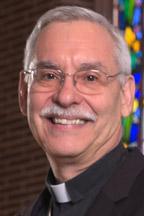
Bishop Anthony B. Taylor delivered this homily May 3 at the House of Formation. See updated guidelines announced May 4.
Today is Good Shepherd Sunday. Every year on the fourth Sunday of Easter we recall that Jesus is our shepherd and we are the flock he guides. And since one of the ways he cares for the flock is through his priests, this is a day when we pray for vocations and we pray for those of us who are already engaged in ordained ministry.
This is why we call the priests in parish ministry “pastor,” meaning “shepherd,” or “associate pastor.” That is why I as bishop use a crozier, the shepherd’s staff that shows that as bishop, a word that means “overseer,” I am the chief shepherd of the diocese.
But all of us know that Jesus is really the chief shepherd of our diocese. We are just his co-workers, each of us priests called to be an “alter Christus,” another Christ, modeling our shepherding on that of Jesus, the Good Shepherd who laid down his life to protect the flock, to keep the flock safe from all that could do them harm.
But how do we do this in this age of COVID-19 when due to the very nature of this contagion, ill-considered — albeit well-intentioned — attempts to minister to the flock might in fact do more harm than good? It is one thing for heroic priests to risk their own lives in caring for the flock, but what do we do when such efforts would instead risk other people’s lives along with our own?
We do what we can to care for both the physical and spiritual needs of those the Good Shepherd entrusts to our care.
Hence the suspension of public Masses in order to maintain necessary physical distancing, but livestreaming Masses to better enable people to make a good spiritual communion. Neither is ideal, but we live in an imperfect world, so this balancing of prudence and piety is what the care of the flock requires. And the same is true for adjustments we have had to make in the way the sacrament of Reconciliation is celebrated, in the conditions in which Eucharistic adoration is conducted, not to mention weddings and funerals.
We know the Good Shepherd would not knowingly and unnecessarily expose his flock to mortal danger.
Tomorrow Gov. Hutchinson plans to announce the conditions under which the State of Arkansas will allow religious groups to resume public worship, but we need to remember that there are features of Mass that require physical contact, such that we have to proceed with more caution than many other groups.
None of our priests have arms 6 feet long that would be necessary for maintaining physical distancing when distributing Communion, and of course his hands touch every host. Indeed, all of our sacraments involve close contact between the priest and his people.
Last week our Presbyteral Council and our Diocesan Pastoral Council had lively discussions about the options before us: how we should respond to what we hope Gov. Hutchinson will say tomorrow, what will eventually be required to return to the way things were before this pandemic hit, what we can do in the meantime and what new opportunities have arisen out of the limitations that this pandemic have forced upon us.
For instance, livestreaming Masses for our shut-ins, which many parishes will want to continue even after the public celebration of Mass resumes, greater interest in eucharistic adoration and the Liturgy of the Hours, families spending more time praying together in the home, greater appreciation and longing for the Eucharist, not taking it so much for granted. And even more mundane improvements: increased readership of Arkansas Catholic, greater participation in online giving.
The Lord continues to shepherd us, turning even this adversity to his purposes, admittedly in ways that we cannot fully understand at this point.
But you know, he’s already been doing this for 2,000 years. He knows what he’s doing, even if we don’t. He’s our Good Shepherd and so we are in good hands.
Please read our Comments Policy before posting.
Article comments powered by Disqus 2023 Year in Review: Community, teamwork prove pivotal
2023 Year in Review: Community, teamwork prove pivotal
 Ark. Catholic schools grapple with teacher shortage
Ark. Catholic schools grapple with teacher shortage
 COVID effects still reduce distribution of Eucharist
COVID effects still reduce distribution of Eucharist
 Sign of peace: Are gestures replacing handshakes, hugs?
Sign of peace: Are gestures replacing handshakes, hugs?
 Pandemic pushes kids’ mental health crisis to forefront
Pandemic pushes kids’ mental health crisis to forefront
 Studio 3:16 offers new approach to teaching religion
Studio 3:16 offers new approach to teaching religion
 After three decades, NLR principal plans to retire
After three decades, NLR principal plans to retire
 CHS athlete overcomes odds to reach collegiate goal
CHS athlete overcomes odds to reach collegiate goal
 John Calipari: UA basketball coach and devout Catholic
John Calipari: UA basketball coach and devout Catholic
 'Cabrini' film tells story of saint with great faith
'Cabrini' film tells story of saint with great faith
 St. Joseph a model of solidarity with immigrants
St. Joseph a model of solidarity with immigrants
 Two gifts after Jesus’ death: Virgin Mary and Eucharist
Two gifts after Jesus’ death: Virgin Mary and Eucharist
 Why we have an altar, and not just a communion table
Why we have an altar, and not just a communion table
 Pope: Wars should be resolved through nonviolence
Pope: Wars should be resolved through nonviolence
 Living relationship with Jesus Christ in the Eucharist
Living relationship with Jesus Christ in the Eucharist